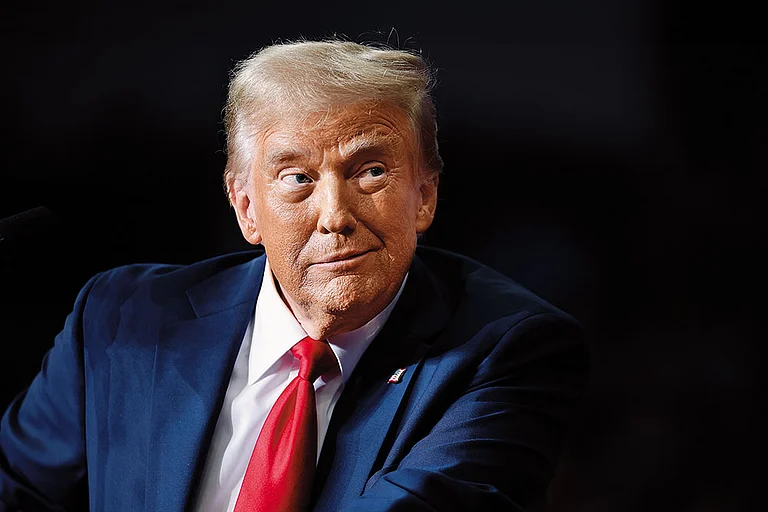The US has extended the implementation of "reciprocal tariffs" by three more weeks, but not as a reprieve for its trading partners. Instead of the July 9 deadline, the tariffs will now kick in on August 1, if no agreements are reached. Commerce Secretary Howard Lutnick and Treasury Secretary Scott Bessent confirmed this new timeline over the weekend.
Mini-Deals to Maximum Pressure: Will Trump's Trade Playbook Help Meet August 1 Deadline This Time?
Donald Trump delays tariffs to August 1 but warns partners to accept new trade terms or face up to 70% duties. With India, EU and others holding firm, global trade faces a tense July
President Donald Trump had imposed country-specific reciprocal tariffs on April 2. However, just days later, the White House hit pause, allowing a 90-day window for negotiations. As that window draws to a close on Monday (8 July), the US has yet to secure comprehensive trade deals with most of its key trading partners.
Only two exceptions — the United Kingdom and Vietnam — have struck deals so far with the US. Perhaps a "mini trade deal" with the UK. CNBC reported that London is still working on bringing down tariffs on key industrial metals. Washington and Beijing, meanwhile, agreed to temporarily lower levies on each other's goods.
Speaking aboard Air Force One on Friday, President Trump told reporters that the US would “probably” begin enforcing the tariffs from 1 August. “Tariffs will take effect on August 1, but the president is currently setting the rates and finalising the deals,” Lutnick said, standing alongside Trump.
In a separate interview with CNN, Bessent warned that the tariffs would "boomerang back" to their previously high levels unless agreements are finalised by July 9.
In a post on Truth Social, the President stated that "United States Tariff Letters, and/or Deals," with various Countries from around the World, will be delivered starting 12:00 pm (Eastern), July 7. Reportedly, President Trump has signed "take it or leave it" letters to 12 countries, slapping new tariffs of 10% to 70% on their exports to the US.
What's Holding Up?
Even as countries are acting swiftly to close a deal with the US, they also remain cautious about sacrificing domestic interests for the sake of a rushed deal.
This sentiment was echoed in India last week, where Commerce and Industry Minister Piyush Goyal stressed that India would not be pressured into accepting any agreement under artificial deadlines. "India never does any trade deal based on deadline or time frame. When the deal is done properly, and is completely finalised and is in the country's interest, then we will accept it," Goyal told reporters when asked about the proposed interim trade agreement with the US.
Finance minister Nirmala Sitharaman also weighed in during an interview with The Indian Express, stating that while India would “love to have a big, good, beautiful” trade pact with the US. However, certain red lines—particularly in agriculture and dairy—would not be crossed.
India is simultaneously in talks with other trading partners including the European Union, New Zealand, Oman, Chile and Peru, as part of its effort to diversify trade channels.
Elsewhere, Japanese Prime Minister Shigeru Ishiba said on Sunday, Tokyo will not "easily compromise" in trade talks with Washington. "We will not easily compromise. That's why it is taking time and why it is tough," Ishiba said on a television talk show, CNA reported.
On Sunday, the BRICS group—comprising 10 emerging economies including India, Brazil, Russia, China, South Africa, Iran, Egypt, Ethiopia, the UAE and Indonesia—issued a joint statement expressing “serious concerns” over what it described as “unilateral tariff and non-tariff measures”. In response, Trump posted on Truth Social that any country aligning itself with the “anti-American policies” of BRICS would face an additional 10% tariff.
Washington's Pressure Play
The delay has not gone down well with the US either. Trump on Friday remarked that issuing notices would be much easier than "sitting down and working 15 different things."
Asked on CNN whether the US was resorting to coercion over dialogue, Bessent responded: “It’s not a new deadline. We’re saying this is when it’s happening. If you want to speed things up, have at it. If you want to go back to the old rate, that’s your choice.”
He added that the administration was applying its “maximum pressure” strategy to accelerate negotiations. As an example, he pointed to the European Union, noting that discussions had gained momentum in recent weeks despite a slow start.
With the global trade landscape already grappling with uncertainty, the coming weeks will test not just the resilience of individual economies, but the credibility of multilateral engagement itself. Whether Trump's “take it or leave it” diplomacy leads to genuine trade reform or deepens global divides remains to be seen.

